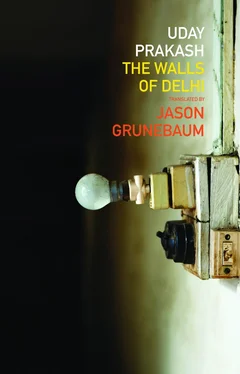I first met Ramnivas by Sanjay’s. He had a good reason for frequenting the neighbourhood: he was chasing after a girl named Sushma. She was a part-time servant who washed dishes and did chores for a few neighbourhood households, commuting every day from Samaypur Badli, where Ramnivas also lived. Ramnivas had accompanied her several times, smoking cigarettes or bidis at Sanjay’s or drinking chai at Ratanlal’s while she worked. Sushma was seventeen or eighteen, a full ten years younger than Ramnivas. He was dark-skinned and lean — if the actor Jitendra were a little poorer, a little darker, and a little skinnier, you’d have Ramnivas. Sushma had a thing for him; you could tell just by watching them walk side by side.
The secret that I’ve been wanting to tell you is connected with the tale of Ramnivas. But please, promise me this: don’t tell anyone who told you. You already know that I’m in way over my head, and if anyone found out, I’d be drowning in danger.
I saw Sushma just yesterday, and even today she came to clean a few houses in the neighbourhood. Every day, she still comes. Just like always.
But Ramnivas?
No one’s seen him around for a few months, and no one’s likely to see him anywhere for the foreseeable future. Even Sushma doesn’t have a clue where he is. I’ve already told you about this kind of life: a man who you see every day can suddenly disappear, and never be seen again, not a scrap to remember him by. Even if you went looking for him, all you’d find — at most — would be a little damp spot on a square of earth where Ramnivas had once existed; and the only thing this would prove is that on that spot some man once did exist, but no more, and never again.
I’d like to tell you, briefly, about Ramnivas: a simple account of his inexistence that will reveal the first hint of the secret — the secret that these days it’s vital we all know.
Two years ago, on Tuesday, 25 May, at half past seven, Ramnivas, as usual, was getting ready to go to work in Saket, forty-two kilometres from where he lives. His wife Babiya not only packed his plastic tiffin full of roti, but also placed a small metal lunchbox in his bag. In it was his favourite: spicy chole with vegetables, and aloo, too. Sushma was already waiting for him by the time Ramnivas got to the bus stop. Today, she was wearing her red polka dotted salwar, had used special face cream, and was looking lovely.
The previous Saturday, she accompanied Ramnivas for the first time on an outing to a movie at the Alpana. During intermission, they’d gone outside and snacked on some chaat-papri. In the theatre and afterwards, and on the bus going home, Ramnivas inched closer and closer to Sushma, pleading with her to say yes, while Sushma continually deflected his advances. After they’d got off the bus and were walking home, Ramnivas announced this before parting: if she wasn’t at the bus stop waiting for him next Tuesday, it meant she wasn’t interested, and they were through.
Now it was Tuesday. Every morning after washing up, he’d ask Babiya for last night’s leftover roti, eating it before he left. This morning, he wasn’t hungry, but weirdly nervous, and tried to hide it from his wife. His heart sank as he left the house, thinking, as he often did, that Sushma was having serious doubts. So when he saw her at the bus stop waiting for him, Ramnivas was so overjoyed that he declared they should ride in an auto rickshaw instead of taking the bus. He insisted and insisted, but Sushma wasn’t persuaded. ‘Why throw away hard-earned money? Let’s just take the bus like we always do.’ Ramnivas had fixed on the idea of sitting very close to her in the little back seat of the rickshaw, and maybe even getting a feel — and so he was crushed at her refusal. But Sushma’s coming to the bus stop was a ‘yes’ signal to Ramnivas, and the man was beside himself. Now really and truly happy, he sensed that his life was about to turn a corner.
He was always picking fights with his wife, Babiya. Doing the housework and looking after the kids left her with no time, and one of the kids was always getting sick. Ramnivas could only remember one time (and he wasn’t even sure of that) when he saw Rohan, his son, horsing around and having fun. Moreover, Ramnivas’ pay cheque wasn’t enough for Babiya to cover household expenses. Even though it wasn’t her fault — she bought only what they needed — Ramnivas would let loose. ‘It’s like your hands have holes in them! Look at Gopal! Four kids, parents, grandparents, and god knows who else living with him, makes less than I do, and still gets by! And you? Night and day, bitch and moan.’ She’d remain silent, but glare at him with a stare whose flames licked at the inside of his head all day long. That stare made sure he watched every penny. When he got hungry, he let his stomach cry out in pain. If he felt like chai, he did what he could to get someone to shout him a cup. He rode the buses all the time without a ticket. Babiya’s burning stare, the one etched in his head, saw to it he never had fun.
That Tuesday, Ramnivas told Sushma he’d leave work early and be at Sanjay’s by two, since that’s where she’d be waiting; then they’d go home together. Sushma had said that she didn’t like waiting for him at Sanjay’s (Santosh, the scooter mechanic, was always trying to flirt with her, and Sanjay, too, was always cracking dirty jokes), but in the end, she agreed.
And then, for the very first time, Sushma, very slowly and very deliberately, instructed Ramnivas to bring her some of those chili pakoras, the ones he’d been going on and on about that they sell by the Anupam Cinema. When Sushma made her request, Ramnivas could swear he heard a note of intimacy in her voice, even a hint of possessiveness, and it made him feel very good indeed. He said casually, ‘I’ll see what I can do, let’s see how things go,’ but had a very hard time concealing the fact that he was jumping for joy. THE BROOM, THE GYM, AND MARS STARES AT JUPITER
Ramnivas went on his way, happy, while singing that song from Kuch Kuch Hota Hai. After punching in, he told his boss, Chopri sahib, that he needed to leave work early to go home because his wife was so sick she needed to be taken to the hospital. Even though he usually gave employees a hard time about leaving early and would insist that vacation forms be filled out, for some reason he readily agreed. ‘Today’s a lucky day,’ Ramnivas thought.
That day, Ramnivas was sweeping the floor of a fitness club in a building that housed various businesses. Cleaning the gym technically wasn’t his responsibility since it wasn’t a government building, but Chopri sahib had instructed him to clean it, explaining to Ramnivas that rich people and their kids went there every day to lose weight.
The gym had every exercise machine imaginable: one for the waistline, another for the stomach muscles, and another for the whole body. The prosperous residents of Saket and their families went there in the mornings and evenings, spending hour after hour busy on the machines. A beauty salon and massage parlour occupied the first floor. Middle-aged men of means would go for a massage and, occasionally, take some of the massage girls back to their car and drive away. Ramnivas had seen policemen and politicians frequent the place.
Govind’s chai stall was right outside, and he told Ramnivas that a girl named Sunila earned five thousand for accompanying gentlemen outside the massage parlour. ‘Who knows what these fucking big shots do with themselves in there,’ he said. ‘I’ve seen them throw after-hours parties, boys and girls right from this neighbourhood.’ Govind did well during the late-night parties since the drinkers and partyers sent out for Pepsi and soda all night long. Indeed, while cleaning the bathrooms, Ramnivas sometimes stumbled on the kind of nasty stuff that suggested that someone had had a good time, and it wasn’t much fun to clean up.
Читать дальше










